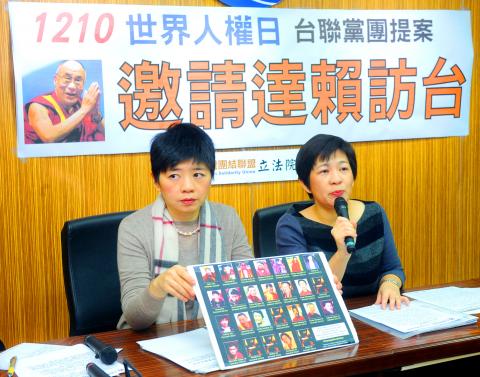The Taiwan Solidarity Union (TSU) yesterday said its caucus would put forth a proposal in the legislature today to invite exiled Tibetan spiritual leader the Dalai Lama to visit Taiwan after the government refused to grant him a visa last month.
President Ma Ying-jeou’s (馬英九) administration denied the Dalai Lama a visa to speak at the Asia-Pacific regional conference of the International Federation of Business and Professional Women, saying the timing was not “opportune.”
The refusal reflects Ma’s kowtowing to China and pro-Beijing stance while sacrificing his previous pledge to uphold human rights, TSU Legislator Huang Wen-ling (黃文玲) told a press conference.

Photo: Wang Min-wei, Taipei Times
Huang said her party could not turn a blind eye to the deteriorating human rights situation in Tibet, where at least 94 Tibetans had set themselves on fire and died over the past three years.
The proposal is to seek a legislative resolution to demand the government officially condemn Beijing’s brutal oppression of Tibetans and establish a panel to probe into the growing number of self-immolations, she said.
“We would also like to invite the Dalai Lama to visit Taiwan to highlight the value the nation places on human rights,” Huang said.
Ma has ignored several issues, including human rights violations and the plight of political prisoners in China, since taking office in 2008, TSU Legislator Lin Shih-chia (林世嘉) said.
Taiwan should pay close attention to what is happening in China — in particular in Tibet — because “what is happening in Tibet now could happen to Taiwan in the future,” Lin said.

Alain Robert, known as the "French Spider-Man," praised Alex Honnold as exceptionally well-prepared after the US climber completed a free solo ascent of Taipei 101 yesterday. Robert said Honnold's ascent of the 508m-tall skyscraper in just more than one-and-a-half hours without using safety ropes or equipment was a remarkable achievement. "This is my life," he said in an interview conducted in French, adding that he liked the feeling of being "on the edge of danger." The 63-year-old Frenchman climbed Taipei 101 using ropes in December 2004, taking about four hours to reach the top. On a one-to-10 scale of difficulty, Robert said Taipei 101

Nipah virus infection is to be officially listed as a category 5 notifiable infectious disease in Taiwan in March, while clinical treatment guidelines are being formulated, the Centers for Disease Control (CDC) said yesterday. With Nipah infections being reported in other countries and considering its relatively high fatality rate, the centers on Jan. 16 announced that it would be listed as a notifiable infectious disease to bolster the nation’s systematic early warning system and increase public awareness, the CDC said. Bangladesh reported four fatal cases last year in separate districts, with three linked to raw date palm sap consumption, CDC Epidemic Intelligence

Two Taiwanese prosecutors were questioned by Chinese security personnel at their hotel during a trip to China’s Henan Province this month, the Mainland Affairs Council (MAC) said yesterday. The officers had personal information on the prosecutors, including “when they were assigned to their posts, their work locations and job titles,” MAC Deputy Minister and spokesman Liang Wen-chieh (梁文傑) said. On top of asking about their agencies and positions, the officers also questioned the prosecutors about the Cross-Strait Joint Crime-Fighting and Judicial Mutual Assistance Agreement, a pact that serves as the framework for Taiwan-China cooperation on combating crime and providing judicial assistance, Liang

US climber Alex Honnold left Taiwan this morning a day after completing a free-solo ascent of Taipei 101, a feat that drew cheers from onlookers and gained widespread international attention. Honnold yesterday scaled the 101-story skyscraper without a rope or safety harness. The climb — the highest urban free-solo ascent ever attempted — took just more than 90 minutes and was streamed live on Netflix. It was covered by major international news outlets including CNN, the New York Times, the Guardian and the Wall Street Journal. As Honnold prepared to leave Taiwan today, he attracted a crowd when he and his wife, Sanni,